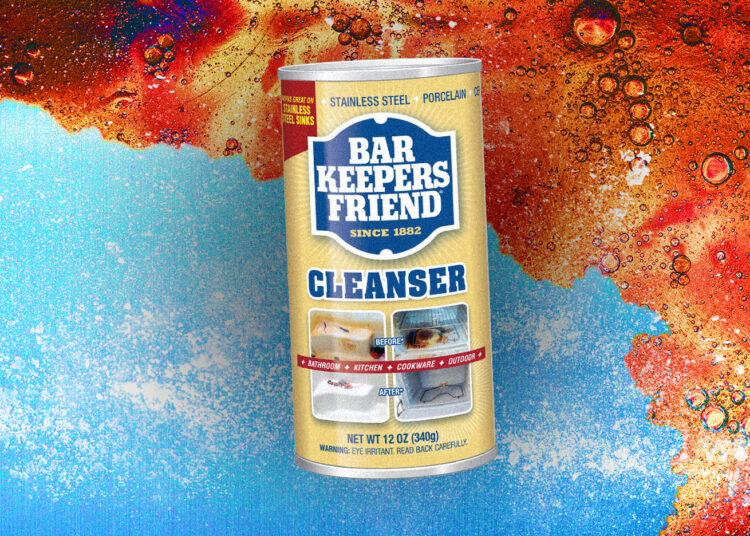Lille Allen/Eater
It takes a very special abrasive cleaning powder to inspire unswerving devotion
Doing dishes is, objectively, the worst part of cooking, especially when you’re talking about scrubbing pots and pans. And there’s really no way to get around it. You can eat out, or you can cook and do dishes. Considering that this task is inevitable, something you’ll probably have to do every day for the rest of your life, you might as well make it as easy as possible. Bar Keepers Friend is the best way to do that.
On the market since the 1880s, Bar Keepers Friend is not glamorous — it’s just a cardboard canister full of fine abrasive powder. It was invented by a chemist in Indianapolis, and sold to bars to keep their brass rails and other finishes nice and shiny. Now, over a century later, it’s a staple of my cleaning repertoire thanks to its ability to rapidly remove even the most intense of burnt-on gunk. This comes in especially clutch when you’ve made a brutal cooking mistake, say, burning an entire batch of caramel in your favorite stainless steel pan.
If you’re really a clean freak, you can use Bar Keepers Friend to keep your pots and pans sparkling clean. Over time, most cookware develops stains due to a buildup of carbonized oil. Those stains aren’t unsafe, but they are unsightly, and this powder is the best way to knock them out in a hurry. I’ve also used Bar Keepers Friend to remove random stains from my stainless steel sink, sticky tags from a set of vintage glasses, and those weird utensil marks from my stoneware plates.
There are, of course, other abrasive cleaners, but what sets Bar Keepers Friend apart is its super-fine texture, attributed to the ground feldspar that it’s made from, which breaks down stains and makes them easier to scour away. (There’s also a liquid version, but I prefer the original.) Using only a little water and some elbow grease, I’m always amazed at how quickly whatever kitchen nightmare I have created ends up down the drain. And sure, this sounds a little bit like a 1950s Good Housekeeping advertisement, but considering that Bar Keepers Friend has been a staple in kitchens for more than 100 years, it’s clear that it maintains a devoted fan base.
All that said, Bar Keepers Friend isn’t for everything, namely anything that will scratch easily. According to the brand, it’s safe for pretty much any non-porous surface, such as stainless steel, ceramic, and porcelain. You shouldn’t, however, use the stuff on nonstick skillets, marble, granite, or anything that’s been painted. Cast iron is also out — you don’t want to scrub away all the work you put into seasoning that skillet! The company also advises against using it on silver, but I’ve personally used it to bring dingy, patinaed vintage pieces back to life with surprising success.
When you use it, you’ll also want to consider wearing gloves, because that abrasive powder (and the oxalic acid within) will really do a number on your hands. Don’t mix it with bleach, because that would create poisonous chlorine gas, or ammonia. Really all you need to make Bar Keepers Friend work best is a small amount of water. Make a paste with the powder, scrub it on your pot or pan, and behold the shiny surface that emerges from all that burnt-on sludge.














